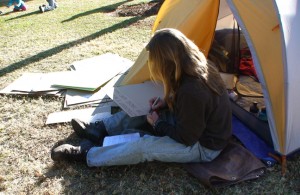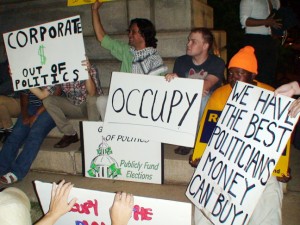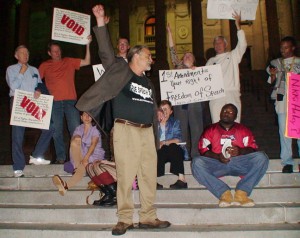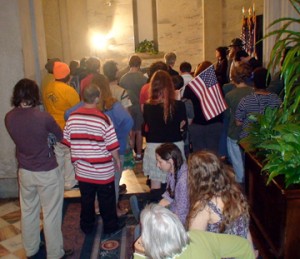“While camping out at the State House may not be a constitutional right, the governor is going about changing the regulations in a wrong and dangerous way,” said Brett Bursey, director of the SC Progressive Network.
Occupy Columbia protester works on his sign Dec. 18 at State House.
The governor is proposing to use the emergency regulations clause to bypass the laws (1-23-120) that require public notification, public hearings and legislative consideration for new regulations. The emergency regulations allow a state agency to have regulations approved immediately upon filing with the state Legislative Council. There is no public notice, no hearing and no legislative review of Emergency regulations.
“One would anticipate such an extreme measure to apply to plagues and natural disasters, not to tents on the State House grounds,” Bursey said.
Past emergency regulations have only been enacted by DHEC for imminent health threats to a community, or considered by the Department of Public Safety during a hurricane evacuation.
“We have an established constitutional process to make new regulations that mandates notice and public hearings,” Bursey said. “Through this process people may decide that ‘free speech camping’ is not allowed on state property, but neither the governor nor the Budget and Control board has that emergency authority. If the emergency regulation can be used in this fashion, there would be nothing to prevent the Department of Agriculture from suspending immigration laws to prevent the ‘imminent peril’ of peaches rotting in the fields as a threat to public welfare, or SLED from declaring union pickets a threat to public safety.”
It’s clear that the governor is more concerned with appearances and politics than with our state’s laws. “She doesn’t want tents on the State House lawn when the legislature returns in January or during the Republican presidential primary Jan. 28. While the governor may find tents on the lawn tacky, they hardly constitute an imminent peril to public welfare. One could argue that the imminent peril is that our democracy has been occupied by monied interests, and the tents on her lawn are a legitimate response.”
The SC Progressive Network suggests that the Budget and Control Board move on to part (B) of the governor’s request, which is to draft regulations for the use of the State House grounds through the established process.
The federal court admonished the state at a Dec. 14 hearing that the GROW v. Campbell decision of 1989 required the state to establish regulations regarding First Amendment expression on state property. Those rules were never codified. (GROW had permission to put a sign on the State House grounds opposing sending the SC National Guard to Central America, at a time when federal troops were banned. The rules were changed – the day the sign was to go up – to prohibit all signs. The court issued a directed verdict of guilty against the state and governor for changing the rules in order to violate GROW’s First Amendment rights. Part of the settlement was the promulgation of new rules.)
Bursey was director of the Grass Roots Organizing Workshop (GROW) when the organization successfully sued Gov. Carroll Campbell over his suppression of free speech on the State House grounds. In 1994 GROW organized the founding of the SC Progressive Network.
“For the past 22 years there has been an operative policy that you don’t need permission to exercise free speech on state property,” Bursey said. “With Occupy Columbia challenging the governor’s sense of decorum, it looks like we need to put the policy in writing.”




